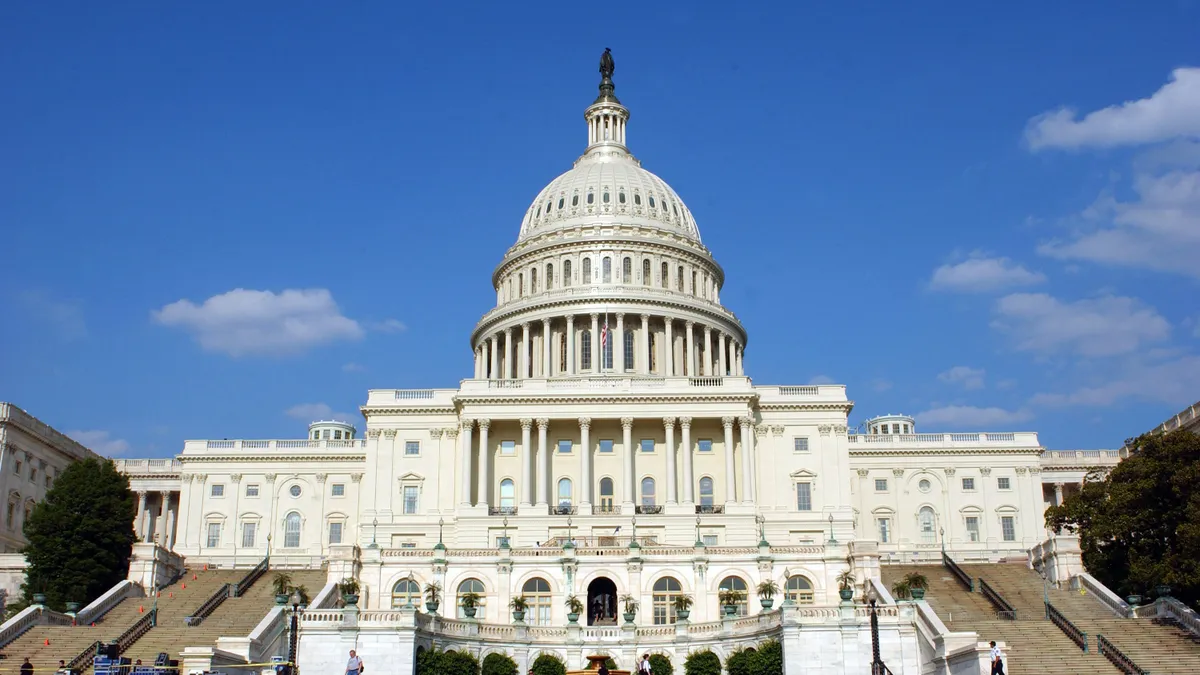Dive Brief:
- The Senate passed the $1.2 trillion infrastructure bill Tuesday, which includes a provision to end the Employee Retention Credit (ERC) on Sept. 30 — three months earlier than expected. This would undercut "one of the only recovery tools available" to restaurants, Sean Kennedy, EVP of public affairs at the National Restaurant Association, said in an emailed statement. The bill now faces the House of Representatives.
- The ERC gives businesses with 500 or fewer employees a payroll tax credit of up to 70% of qualified wages. The maximum credit is $28,000 per employee for all of 2021 (or $7,000 per quarter). Employers with over 500 full-time workers are eligible if they experience a reduction in revenue of more than 90% compared to the same quarter in 2019.
- The NRA argues this development makes it even more imperative the Restaurant Revitalization Fund be replenished.
Dive Insight:
Congress members on Saturday made a third attempt to refill RRF, but it was ultimately fruitless. A bipartisan contingent of senators, including Ben Cardin (D-Md.), Roger Wicker (R-Miss.) and Senate Majority Leader Chuck Schumer (D-NY) proposed to infuse $48 billion in emergency funding to RRF. The group pursued unanimous consent to pass the bill, but an objection brought proceedings to a halt.
"The independent restaurant and bar community applauds Majority Leader Schumer and Senator Cardin for their efforts to refill the Restaurant Revitalization Fund," Erika Polmar, executive director of the Independent Restaurant Coalition, said in an emailed statement. "Congress and the White House must prioritize relief for restaurants immediately to prevent long lasting damage to the industry and millions of people it employs."
An early end to the ERC could be salt in the wound for restaurants already struggling in the absence of federal grants. The NRA said the tax credit has been a key tool in the restaurant industry's recovery and that ending this provision early could undermine this progress.
Still, the NRA praised the infrastructure bill for the potential long-term benefits it could bring to the restaurant industry.
"Overall, our country and our industry rely on an efficient national infrastructure, and this measure definitely makes the investments that we will need in the long-term — funding for new programs to encourage truck driving and recycling initiatives, for example, that will further advance the future of the restaurant industry. We applaud this leadership from Congress," Kennedy said.
In the shorter term, restaurants still have some hope to cling to when it comes to extended federal aid. Congress could replenish RRF in the $3.5 trillion budget reconciliation bill, which passed the Senate Wednesday morning. House and Senate committees have until Sept. 15 to write their portions of the package, which will be combined and then debated as a solitary piece of legislation.
Congress introduced the Restaurant Revitalization Fund Replenishment Act of 2021 in June to add $60 billion to the pot, but the bill was never voted on. The following month, the Entree Act was introduced by Congressman Blaine Luetkemeyer (R-MO) to inject $60 billion in RRF by rescinding money from unspent Economic Injury Disaster Loans and other state and local funds within President Joe Biden's American Rescue Plan.













